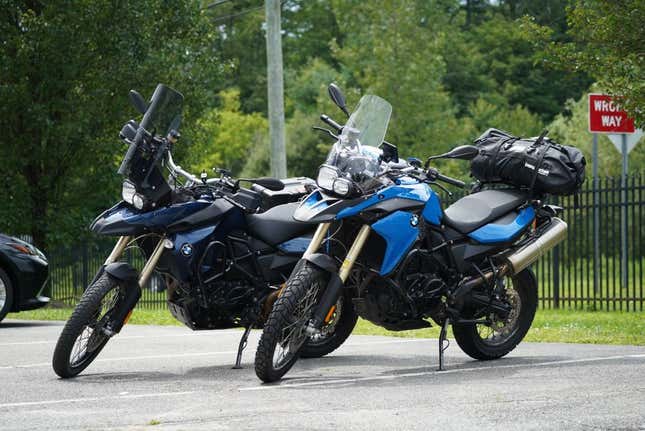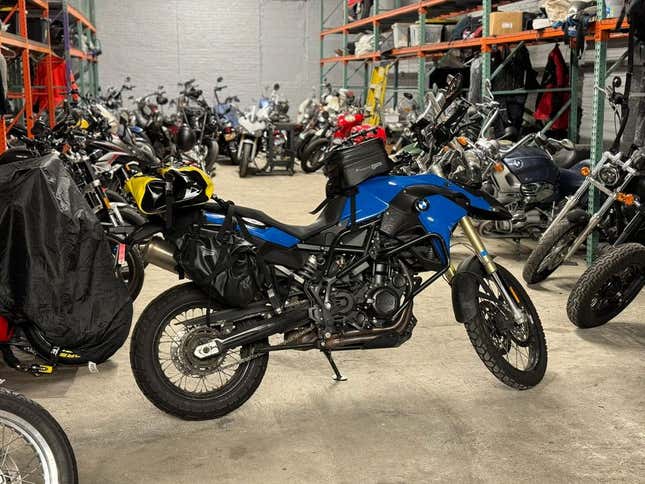I put my beloved BMW F800GS up on the market final week. I purchased it practically a yr and a half in the past for the identical cause anybody buys an journey bike: That dream of in the future getting on the market, away from every little thing, simply you and your metal horse towards the luxurious, inexperienced world.
After shopping for the GS — my second journey bike from BMW — I joined ADV boards, pored over path maps for multi-day dust rides, even began figuring out the specifics of motorbike tenting. I’ve labored my method into the place of Jalopnik’s resident ADV girlie. However I by no means did these multi-day rides, I by no means bought round to motocamping. Even when I had, I purchased the mistaken bike for them.

I do know, I do know, ADVs are speculated to be excellent. They’re so sizzling proper now, with everybody from Yamaha and Royal Enfield to Triumph and Ducati trying to get a bit of the pie first baked by BMW in Eighties. They will do something, go wherever, from the race monitor to the Erzbergrodeo. Should you want one bike for all events, an ADV is the one solution to go.
I name bullshit.
An ADV will do practically any job, on this level I received’t argue. You possibly can monitor them, tour on them, take them to the best peaks and lowest valleys. The issue is that, having completed a little bit of every little thing on this GS, I’ve realized there’s no scenario during which it’s the bike I truly need to be on for no matter I’m doing.
Most of my driving occurs inside Brooklyn, the place I’m touring stoplight to stoplight at what my GS says is a mean of 10 complete miles per hour. At these speeds, a 500-pound bike that sits its weight over ten and a half inches off the bottom is a tippy, clumsy proposition — I’d reasonably be on an upright bare bike. Or a supermoto, if I need to go on to curb-hopping asshole jail.
On monitor, the GS continues to be large and heavy, however monitor driving provides extra grievances to the record. The faux tank’s cutouts aren’t nice for hooking a knee into whereas leaning, the engine doesn’t make aggressive energy, the tires are solely rated to 99 miles an hour while you’re attempting to do 105 down the entrance straight within the rain — I’d reasonably be on a sportbike, positive, however even one thing with wider bars on a sportbike body can be a step in the appropriate path.
But, while you’re offroad, journey bikes are nonetheless large and heavy. Dust bikes usually have a single cylinder, and this twin-cylinder tourer with all its gas capability weighs practically double what even an enormous dust bike does. That’s extra weight to hustle via tight trails, extra weight to choose up while you inevitably drop the bike — I’d reasonably be on a real twin sport, with a single cylinder and a license plate.

The closest the GS will get to feeling prefer it’s in its factor is the freeway, the place the oft-omitted again half of the journey touring title makes itself recognized. I can load the bike up with baggage, hit the freeway, and let that 360-degree parallel twin lope alongside for hours. The windscreen leaves a little bit of consolation to be desired, positive, particularly in my highly-vented journey helmet, however to enhance on that you just’d want one thing like a Gold Wing or a dresser. Which you may get, and for lower than this BMW value me.
Mash the classes collectively, and also you get different cross-market bikes that exist already. A metropolis/monitor rider can be higher served by a unadorned, with a sportbike body and extra upright bars. A monitor/touring rider wants a sport tourer, as does a metropolis rider — although extra for the agility between stoplights there than the uncooked energy. A metropolis/offroad rider wants a twin sport, possibly one of many roughly 6,000 KLR650s on the streets of New York at any given time, whereas a monitor/offroad rider wants one thing like a 701 or 690 Enduro with a spare set of supermoto wheels to strap to the again.
The one place an ADV is sensible — a really purpose-built ADV, one thing greater than a Versys 650 — is for a rider who primarily excursions however nonetheless needs some offroad functionality. That’s excellent for Ewan and Charley, positive, however how many individuals can actually say that’s their real use case? How many individuals commute 100 miles every method each day, hit the dust on the weekends, and don’t have the storage house for a second bike?
However, after all, we don’t purchase bikes primarily based on what we want. To scale back a motorbike to a use case is to disregard the complete emotional facet of motorbike shopping for, and that’s the place journey bikes really shine. You don’t purchase a GS since you spend your weekdays chewing via Iron Butts and your weekends on the Trans-America Path — you purchase a GS since you may.
An journey bike, within the thoughts of its rider, is a ticket to wherever at any time for any cause. The theoretical capacity to do something and every little thing — even when you recognize it received’t do it completely — makes all of the compromises value it to some folks. Simply, to not me.
But, I’m glad I purchased this GS. A pair paragraphs in the past I specified that my working definition of an ADV right here is one thing greater than a Versys 650, and that’s as a result of I stand by what I stated about journey bikes final yr. An ADV’s capacity to do some little bit of every little thing enables you to see dip your toes into loads of ponds, it helps you determine what you do and don’t like on two wheels. My F800GS, with all its specialization, nonetheless managed to show me one thing I don’t like: This pair of wheels.
Sometime, in my future, there’s a retro-styled bare bike ready for me. An XSR, a Z900RS, one thing smaller and lighter and nimbler than a lumbering ADV. I’ll bear in mind my GS fondly, however the aim now’s to bear in mind it — to not proceed experiencing it. So, after a thousand phrases of me saying why you shouldn’t, anybody wanna purchase an journey bike?


